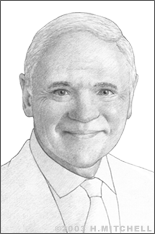Leroy Hood
Scientist and inventor Leroy Hood grew up in Montana. He studied biology at the California Institute of Technology (Caltech) and received his BS degree in 1960. Three years later, he received his MD from Johns Hopkins University, and he achieved his PhD in biochemistry at Caltech in 1967.
Hood has since become one of the world’s renowned scientists in the fields of molecular biotechnology and genomics. At Caltech in 1980, working with colleague Michael Hunkapiller, he developed the gas liquid phase protein sequencer, which enabled scientists to determine the chemical makeup of key proteins. In 1984, Hood and his lab developed the protein synthesizer, which allows researchers to produce large volumes of protein for experimentation.
In 1985, he and his team created what would become perhaps their most important instrument: the DNA sequencer. This device allows for the rapid automated sequencing of DNA. The machine has the ability to determine the order of the four “letters” across the strings of DNA in cells. Each of the letters is dyed with a fluorescent dye, and a computer is able to read whether the chemicals glow in red, green, blue, or orange to determine the positioning of the letters. This invention, which would later improve the speed of DNA sequencing by 3,000 times, led to the possibility of the Human Genome Project, for which Hood was one of the first advocates.
Also in the 1980s, Hood and his colleagues developed the first DNA synthesizer to automate the process of synthesizing DNA gene fragments. This machine strings together fragments of genes in order to manufacture DNA for use in DNA mapping and gene cloning. These four instruments formed the technological foundation for much of the research done in genomics-related fields today.
In 1992, Hood left Caltech to create the Department of Molecular Biotechnology at the University of Washington. This inter-disciplinary department brought together chemists, computer scientists, biologists, engineers, and applied physicists. He later co-founded the Institute for Systems Biology in Seattle, which integrated all of these fields to conduct research on how systems operate.
Hood’s broad range of research interests include cancer, autoimmune diseases, antibody diversity, and stem cell development. He holds a number of patents and has published hundreds of papers and articles. He has also founded or co-founded 17 biotech companies, including Applied Biosystems and Amgen. He is a member of the National Academy of Sciences, the American Philosophical Society, the National Academy of Engineering, and the American Academy of Arts and Sciences.
Hood has achieved many awards for his work, including the Lasker Award for Studies of Immune Diversity in 1987, the 2002 Kyoto Prize for Advanced Technology, the 2003 Lemelson-MIT Prize, the 2004 Biotechnology Heritage Award, the 2006 Heinz Award in Technology, the National Medal in science in 2011, the National Academy of Science Award for Chemistry in Service to Society in 2017, among others.
Hood is currently the Senior Vice President and Chief Scientific Officer at Providence St. Joseph Health and is also a professor and Chief Strategy Officer at the Institute for Systems Biology, which he co-founded. Hood's strong dedication to finding answers in his research is driven by the desire to improve the health of people worldwide.
You can learn more about Hood in this case study.


